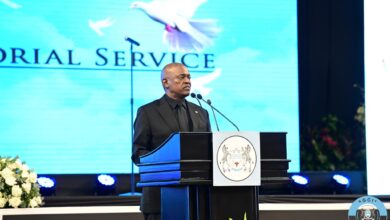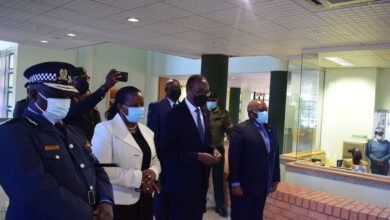
MINISTER OF ENVIRONMENT, NATURAL RESOURCES CONSERVATION AND TOURISM (MS KERENG): Thank you Mr Speaker. Good morning and thank you for the question Honourable Member. This question is about Sengaparile plant.
Mr Speaker, as I have been asked about the position of the Ministry with regard to the Sengaparile plant, let me point out that we have noticed that Sengaparile is a very important plant when it comes to health and reviving the economy of our people back at home who reside in areas where Sengaparile plant is found. Let me point out that in this transforming Government, we consider.
Sengaparile as a plant that can be used to fight diseases.
It can be processed and its uses can be enhanced so that it can be beneficial to our people through different and improved processes which can develop the economy. It should be known that Sengaparile has value when it comes to medication; the researches that have been conducted about it shows that it is a herb that cures diseases more especially those that have to do with arthritis, rheumatism and other diseases. That information has indicated that the importance of Sengaparile is well known even outside this country. It is important for us to use this opportunity and revive the economy with Sengaparile.
In Botswana, people who reside in areas where there is sengaparile are already harvesting it and drying it in order to sell it. Department of Forestry and Range Resources gives out 350 to 400 permits to people who are allowed to harvest sengaparile in Jwaneng-Mabutsane.
It has been proven that they can produce an average of 8272 kilogrammes in a year. They harvest it, dry it and then package and sell it. Our ministry hands out permits for them to sell it. We also assist them by ensuring that Sengaparile is purchased. There is a company which is already buying Sengaparile in Jwaneng-Mabutsane constituency for P28.00 per one kilogramme. In 2019, people who sell it made P231 616.00.
Mr Speaker, our ministry is in the process to improve the harvesting of Sengaparile as well as the way it is sold.
We are trying to improve how they are making a living out of it or the way they are generating income with it.
We are currently working with Botswana University of Agriculture and Natural Resources (BUAN) to conduct researches as well as to try and revive the processes which can put sengaparile in the map for it to be used and sold in an improved way. There is already a committee at Department of Crop Science who we work with to try and improve services of harvesting and selling Sengaparile. We are working with Department of Sciences at University of Botswana (UB) to improve research, in collaboration with Thusano Lefatsheng.
We will recall that Thusano Lefatsheng used to sell Sengaparile along Thamaga-Gaborone road. We are reviving this sector so that Thusano Lefatsheng can continue with its researches on Sengaparile plant as well as what we can do going forward.
We are working with Department of National Agricultural Research and Development Institute (NARDI) which was called National Food Technology Research to see how we can package Sengaparile as well as finding out about its value. We have noticed that it can be welcomed in other countries and we already know that it can benefit our economy. Still on that Honourable, our ministry is drafting two Bills, the other one is called Access and Benefit Sharing Bill and it is going to help us in such a way that those who survive on natural resources can have access to them and use them and benefit something from them, so that is can be shared correctly without being robbed or being exploited.
The other Bill is Forestry and Range Resources Bill; Department of Forestry and Range Resources is working on it. It is going to help us to create industries as we know that currently Sengaparile is harvested and sold as a herb, to start industries that can process Sengaparile, doing what is called beneficiation. We should produce it, be it in the form of medicine, pills, or any other different forms, we should do that. Creating those kind of industries for our local people. Let me highlight that these two Bills are still at drafting stage. We believe that they will be presented this year.
Lastly Mr Speaker, the Honourable member asked if we know graduates at Jwaneng-Mabutsane Constituency who can collaborate with the Government to try and improve how we handle Sengaparile; Honourable, we welcome everyone who has the knowledge to come forward since they can be useful to us. After we finish drafting these Bills, we will come up with a strategic framework which will help us to conduct an improved research, processing, to preserve Sengaparile so that it cannot be stolen; Packaging, marketing and so forth.
These things require different expertise. Honourable, maybe we should get in touch with you since you know your voters. You can start to prepare them. They can also form trusts. They can harvest Sengaparile so that we can be able to get hold of you and train them to venture into business like that. Thank you Mr Speaker.
The minister was responding to a question by Member of Parliament for Jwaneng/Mabutsane constituency- Honourable Mephato Reatile. Reatile wanted to know if there are any known medicinal qualities of sengaparile plant and it’s economic impact on the people of his constituency where the plant is mostly found.





